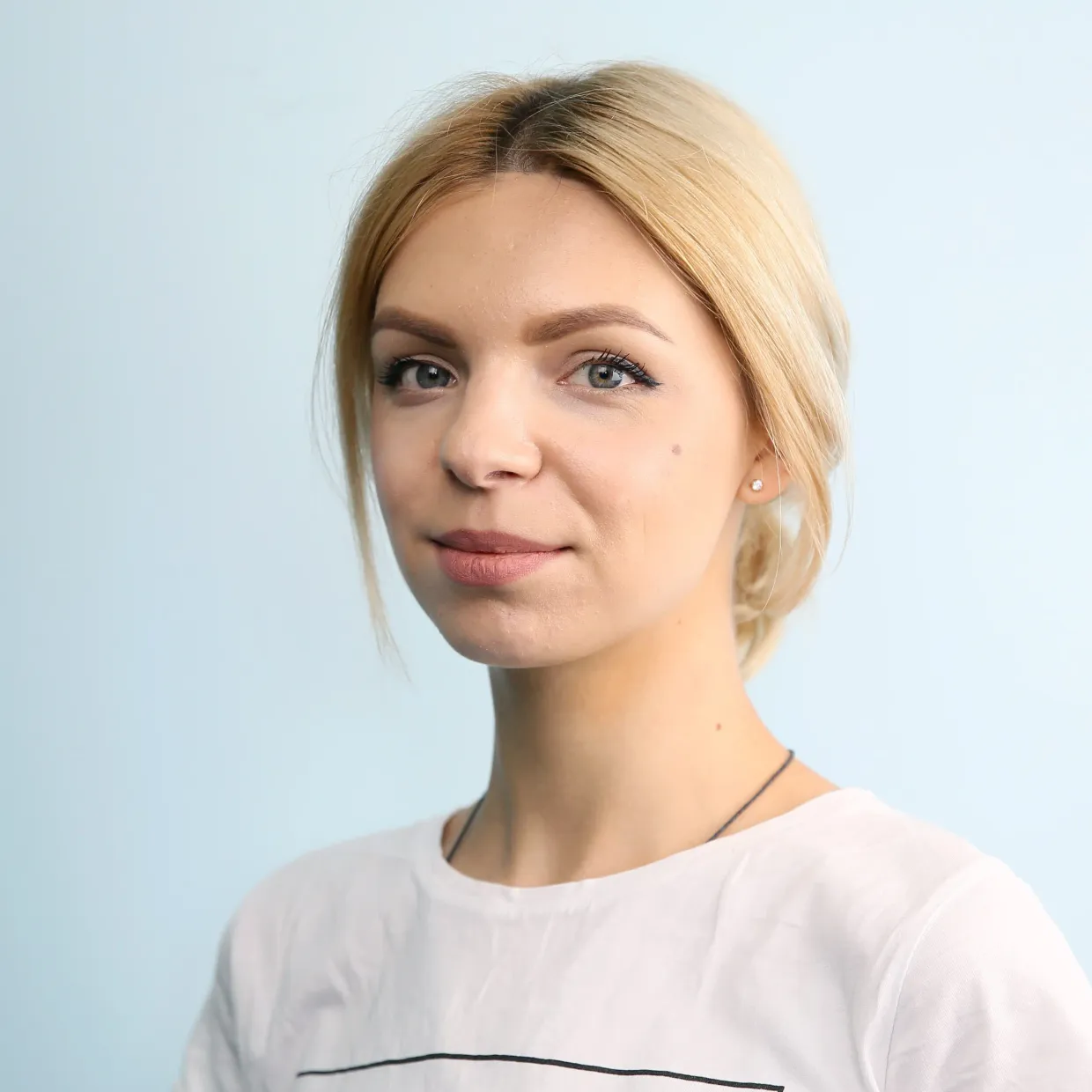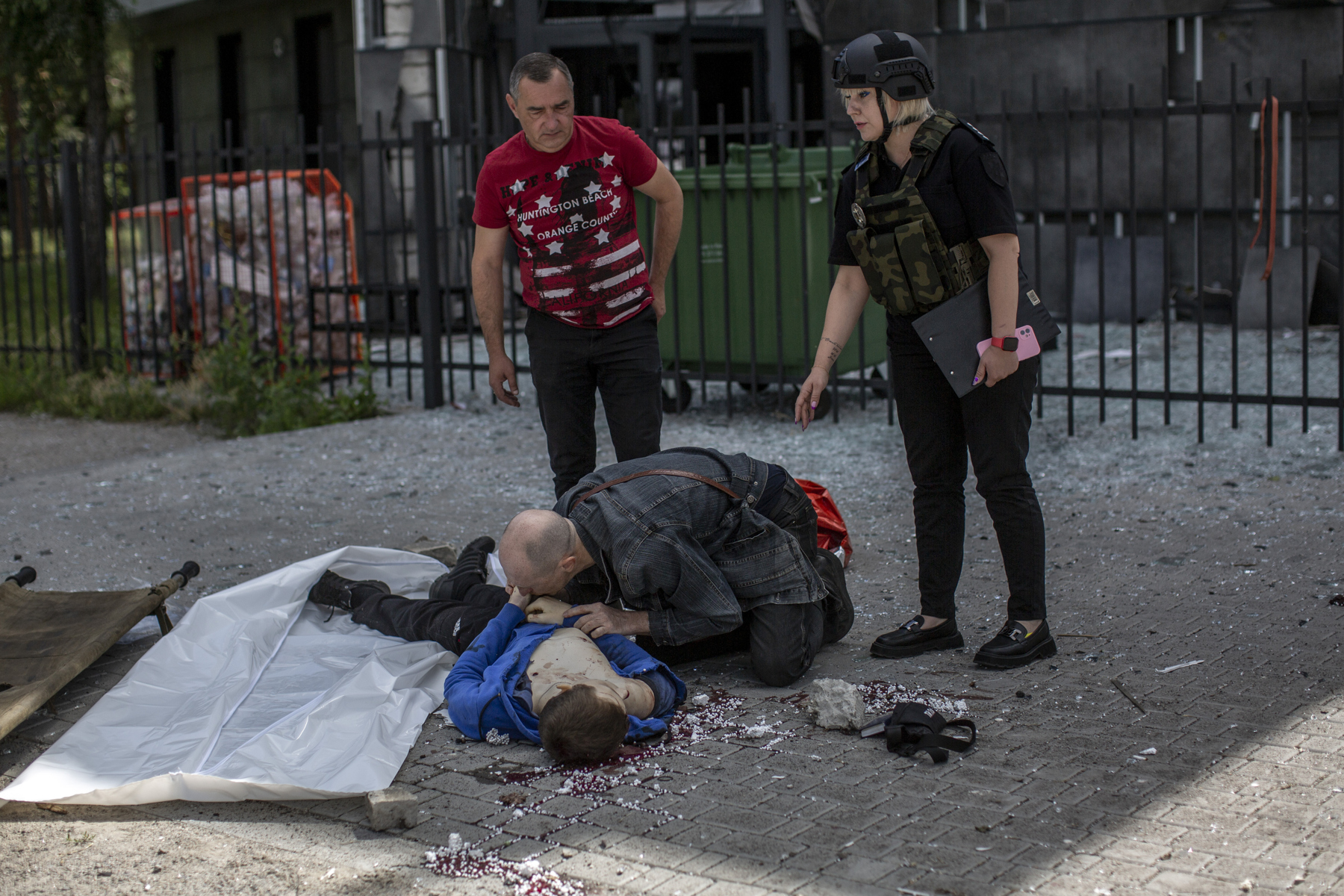On a warm day in early September, Anastasiia Kolchyna took her nine-year-old sons, twin brothers Ruslan and Denys, for a walk.
They went to a small park in their native Zelenodolsk, a town in Dnipropetrovsk Oblast, where many locals would gather on the weekends.
The family was enjoying the outdoors when suddenly, Kolchyna heard someone scream: "Lay down! Lay down!"
"Everyone fell on the ground, putting their hands on their heads," she recalls. "Then the explosions started. I couldn't lift my head from the ground. Everything was in smoke."
She could hear Ruslan screaming somewhere nearby but couldn’t see or hear Denys.
"I knew that he was standing next to me, so I tried to feel him with my left hand," Kolchyna recalls. "I felt his head near my legs and crawled towards him."
When she reached her son, Kolchyna saw blood on his shorts and two "deep, coin-sized holes" on his hips and back. "His eyes were half-open," she says, bursting into tears.
She would soon find out that Ruslan was injured as well, although not as severely as Denys, who was hospitalized shortly after the attack.
"He looked so pale when they brought him in. I kissed him and said, ’Denys, mama loves you so much.’"
Later in the day, several doctors approached her and Ruslan. In shock, she could barely understand what they said. She could only hear Ruslan yelling, falling at a doctor's feet: "My brother can't die. You don't understand; he is my dearest person. There is no one like him," the boy shouted in tears.
"I fell on the floor too," Kolchyna says, crying. "I told them that as long as I live, I would thank them if only they save my child."
"He is gone," the doctor's words echoed in her ears.
That day on Sept. 3, Russian forces attacked Zelenodolsk with Uragan multiple rocket launchers, injuring 10 residents and killing one, nine-year-old Denys Kotelevych, Dnipropetrovsk Oblast Governor Valentyn Reznichenko said.
Since the beginning of Russia's full-scale invasion, Ukrainian children have become targets of horrendous violence. They have been kidnapped, forcibly deported from occupied territories to Russia, taken prisoner, tortured, and murdered.
According to Ukraine's Prosecutor General's Office, Russia's war has killed at least 443 children and injured 855 as of Dec. 8. Some 330 children are considered missing, according to Ombudsman Dmytro Lubinets.
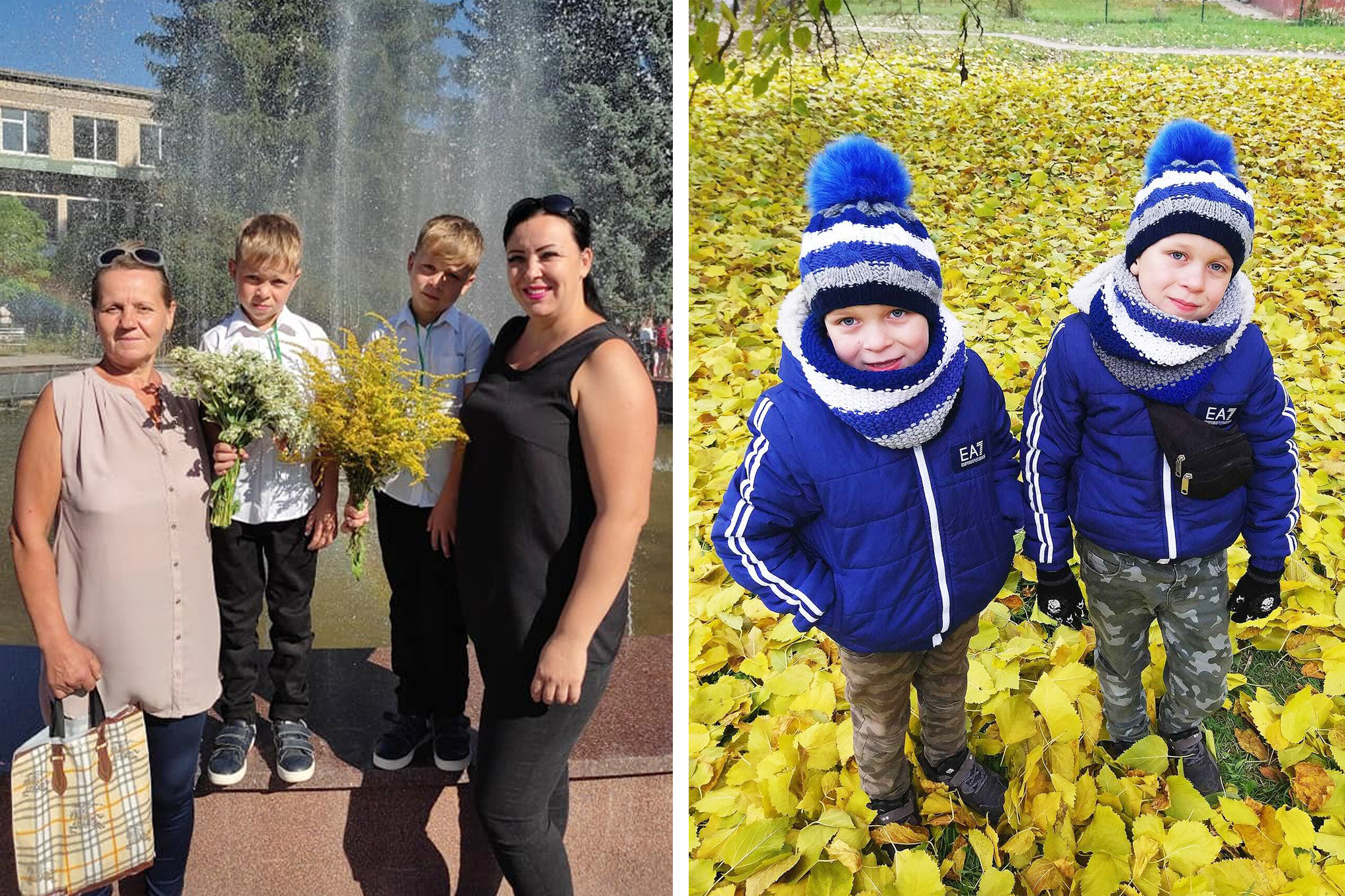
Denys Kotelevych, 9
Kolchyna says her sons were inseparable, active, and very close. Back in kindergarten, when the two were asked who they were friends with, they responded, “no one,” “because why do they need somebody else when they have each other," Kolchyna recalls.
The family’s home Zelenodolsk, a town with a pre-war population of almost 13,000 located in central-eastern Dnipropetrovsk Oblast, has endured Russian attacks since the early days of the full-scale invasion.
The family spent nearly three months in a bomb shelter, rarely leaving it as air raid sirens were off.
Unlike in previous years, the twins didn't go to summer camp and instead spent most of their time at their grandmother's country house. In September, they returned to their mother in time for the start of the school year.
Kolchyna says she didn't hear air raid sirens in the park that day. Some 15 minutes before the attack, local authorities urged residents online to take shelter, but Kolchyna says her mobile internet was not working, so she missed the warning.
"Everything happened so unexpectedly – as if stones began falling from the sky," Kolchyna recalls. "I didn't make it to cover my kids."
The projectile exploded about 30 meters from the bench they had been sitting on. Kolchyna saw a man lying in a "pool of his blood." Later, she would learn that a dozen people received shrapnel wounds, including her mother's neighbor, who is still being treated in the hospital.
"But the littlest was hurt the most," she says, crying.
As Denys was lying there on the ground, unconscious, Ruslan began to crawl near him, saying, “I wish it hit me instead."
There was no pediatric surgeon available at the hospital in Zelenodolsk, so Denys had to be hospitalized in Kryvyi Rih, a larger city located about 50 kilometers north.
By the time Denys was brought to Kryvyi Rih, doctors said it was already too late to save him due to internal bleeding.
As the doctors told her the dreadful news, Ruslan overheard them and started to sob.
"He ran through the wards, shouting, 'Where is my Denys?'" Kolchyna says.
Then, they sat on the floor in the corridor of the hospital, crying hysterically.
Denys was buried on Sept. 6.
About a week before the tragedy, Denys asked his mother if he "would ever die."
"I told him that little children don't die," Kolchyna says. "Then he asked me why I gave birth to them. I said: to love you."
She always will.
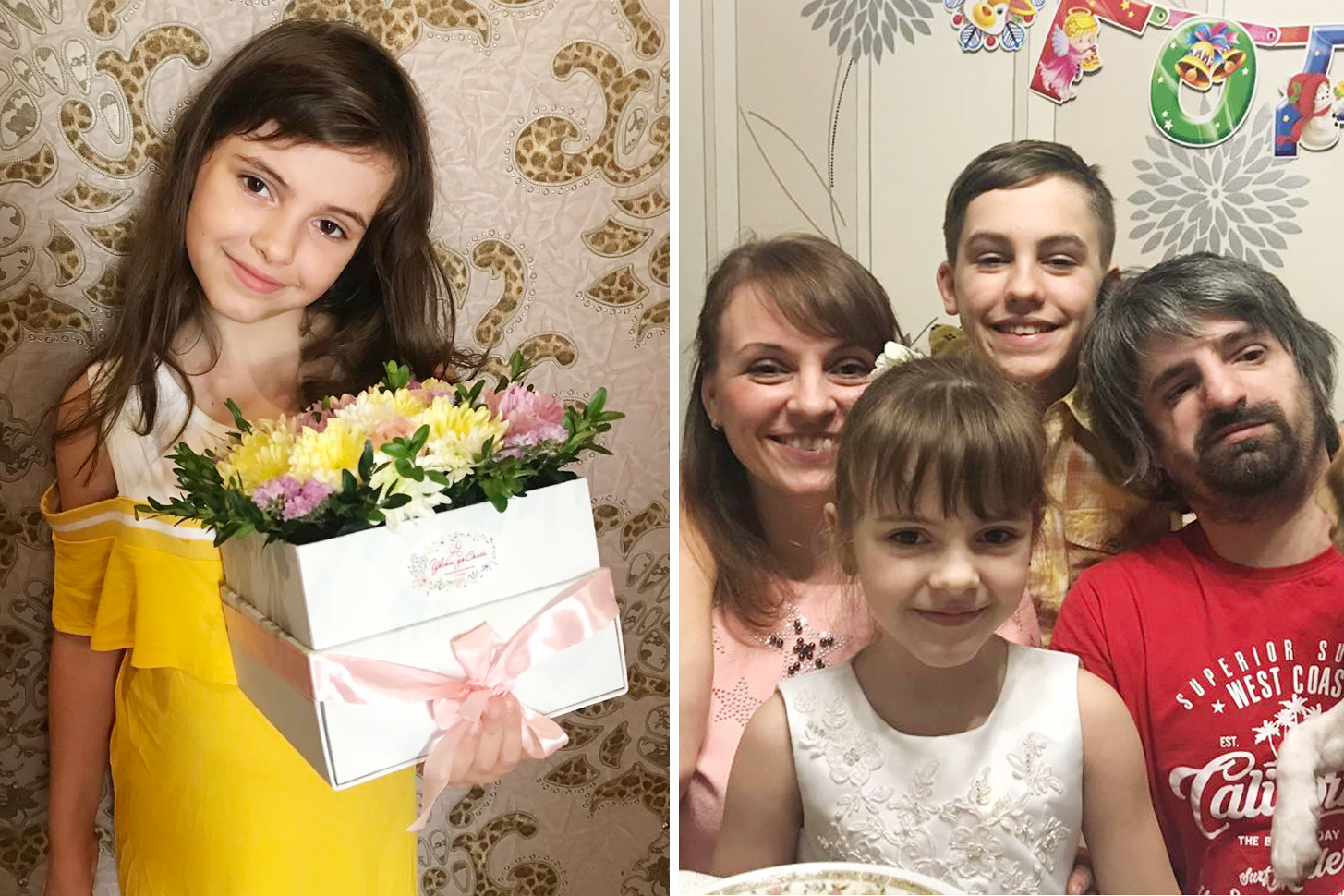
Polina Tutunzhy, 8
Days before the full-scale invasion, the family of Bohdan Tutunzhy came to visit him in Kharkiv, where he had recently found a job at an IT company. They wanted to sell their apartment in Mariupol, Donetsk Oblast, and start a new life in Kharkiv.
On Feb. 19, Tutunzhy's wife Nadiia and their two children, eight-year-old daughter Polina and 15-year-old son Herman, drove back to Mariupol to prepare for moving.
As soon as the invasion started, the family wanted to leave Mariupol but were too frightened to do so, having heard how Russian troops shell civilian cars attempting to escape the city. They decided to wait for evacuation corridors instead.
As of early March, the city was already besieged, trapping the 400,000 remaining residents, according to Mariupol Mayor Vadym Boychenko.
Following heavy Russian attacks, Mariupol was left without water and electricity. Nadiia and the kids had to leave their apartment for their yard to prepare some food. One day, their neighbors stopped by, asking Nadiia and Polina to join them outside.
"The shelling started as soon as they left the building," Tutunzhy says. "The adults were killed immediately, and my daughter… her hips and shoulders were hit."
"Our son stayed at home with the dog," he continues. "It saved him."
Due to the poor mobile connection in Mariupol, Tutunzhy's relatives could only inform him about the death of his wife two days later.
"I was at work," he says. "I just sat on the floor and started crying."
It was then that he learned Polina was still alive. Shortly after the shelling, Tutunzhy's brother carried her to a local hospital: "She was severely wounded, but doctors managed to perform surgery, as the hospital had a power generator."
In spite of the danger, Tutunzhy went to Mariupol to rescue his children.
Amid the heavy shelling, he reached the hospital on March 17, only to discover that Russia's attack had destroyed the generator and half of the children's ward.
"It looked like a horror movie. People lay on the floor. Dust and dirt were everywhere," he says.
In that chaos, Tutunzhy found the doctor and asked him about Polina.
"She died yesterday at 7 a.m.," he heard in response.
"The doctor kept saying something to me, but I didn't hear him. I was in shock."
Tutunzhy stayed in Mariupol for another five days. He wanted to bury his loved ones, but no burial services were operating in the city due to heavy Russian bombardment. The city was also “almost fully occupied,” Tutunzhy said.
He believes that his loved ones were later buried by the Russian troops who marked their graves with numbers instead of names.
Tutunzhy took Herman and their dog and left Mariupol for good.
"Losing a child is the hardest part for any parent," Tutunzhy says.
"Joyful and courageous" is how he will remember his little daughter.
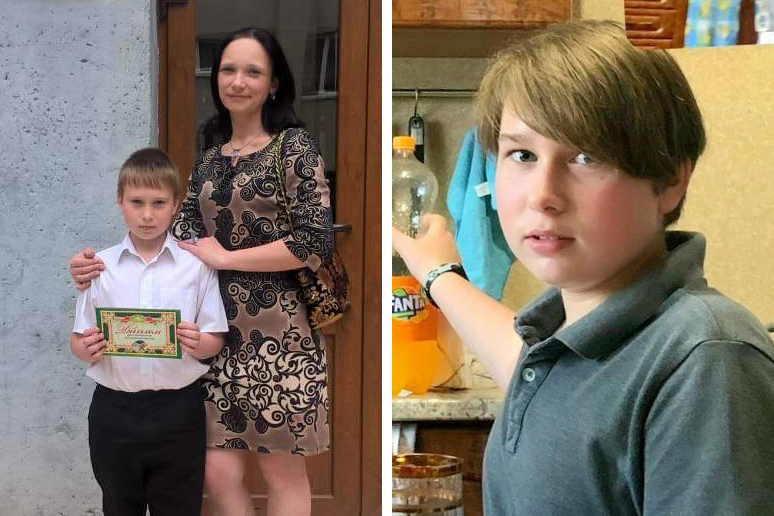
Vyacheslav Yalyshev, 14
A sergeant major at a military unit in Odesa, Olga Yalysheva had spent every evening and weekend at home with her 14-year-old son Vyacheslav before the all-out war began.
They would do homework together, watch movies, and eat snacks on a sofa in their kitchen.
When Russia launched its first attacks on Odesa, Yalysheva was on duty in her military unit. The war forced her to work pretty much non-stop, meaning Vyacheslav's grandparents had to take care of him.
Their "military family" (Vyacheslav's father is a lieutenant colonel, and his older brother is a senior soldier) lived in a dormitory on the territory of her military unit. Yalysheva says she tried to see Vyacheslav as often as possible: "I understood that he missed me, and I missed him a lot as well."
As a service member, Yalysheva was often aware of the possible missile attacks even before the air raid sirens would go off. Whenever that happened, she would ask Vyacheslav and his grandparents to hide in the bomb shelter.
One day, when Vyacheslav was at home during online classes, Yalysheva called, asking her family to hide immediately. She was later told that her son "ran to the bomb shelter while still listening to a teacher's lecture online."
“He was a very responsible student,” she says.
Once in May, Vyacheslav called his mother crying, telling her that due to poor internet, he failed a test at school. She went home to comfort him and returned to the unit shortly.
"When I fall asleep, I see this image of him running towards me. His face is all in tears," she says. "If only I knew this was the last time I saw him."
Later in the day, Yalysheva was warned of a missile threat from Russia. As usual, she called to warn her family. Aside from Vyacheslav and his grandparents, another elderly couple has often been hiding in that shelter. Before hiding himself, Vyacheslav decided to alert them.
"He was outside when a Russian missile hit the building," Yalysheva says. "A wall fragment hit him in the head," she adds, crying.
"His heart was beating, although he was already dead."
Vyacheslav’s grandfather was also outside when the missile hit the building. He suffered a heart attack after seeing his grandson killed.
Yalysheva says her son “sacrificed his life” to warn that elderly couple.
"Our hero, our angel," she says, crying.
___________________________________________________________________________________________________________________________
Note from the author:
Hi! Daria Shulzhenko here. I wrote this piece for you.
Ever since the first day of Russia's all-out war, I have been working almost non-stop to tell the stories of those affected by Russia’s brutal aggression. By telling all those painful stories, we are helping to keep the world informed about the reality of Russia’s war against Ukraine. By becoming the Kyiv Independent's patron, you can help us continue telling the world the truth about this war.
